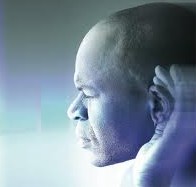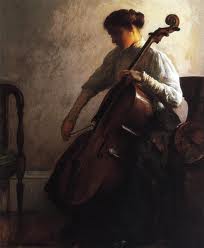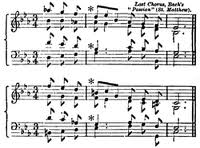Why does music move us? part 5
woensdag, 07 maart 2012 21:28Pitch
As regards pitch, we notice immediately that there is an enormous diversity in pitch of sounds, from very low sounds to very high. We know also that man’s ear is limited in its capacity to detect the pitch of sounds, that there are animals which are capable of hearing sounds at a pitch that man cannot hear. It would be interesting to explore how far animals’ sensing of dangers in the physical world that are movements, such as earthquakes and tidal waves etc., is by hearing. We observe a correspondence between the pitch of a sound and the location of its origin in the physical world: deep, low sounds we can associate with the ‘below’ of the earth, higher sounds with the ‘above’ of the sky. (Perhaps the phenomenon of thunder is so alarming precisely because it is a deep, low sound coming from up above us.)
The pitch of a sound being due to the frequency of the vibrations set in motion by a body resonating due to a movement against it, we notice that there are vibrations that we ‘feel’ throughout our whole body as well as hear, or indeed sometimes that we feel rather than hear. There is a certain touch involved here. This is the case particularly for low sounds. (Animals’ advantage over man for the detection of movements in the physical world perhaps lies in this sensing of movement that is closer to touch, although we should not forget that man is the animal with the most refined sense of touch.) Thanks to the intermediary of the air, a certain contact, therefore, is established between the matter that resonates when struck, and the matter of my body, with the ear being the organ of the body especially designated for the reception of sound, an organ extremely refined for that purpose, even though, as we have noted, it is limited in the range of pitches it can detect.
The pitch of a sound, then, is fundamentally to do with the matter of a body that resonates, and on the receiving end, with the matter of my own body. If we were to look more closely at how matter is linked to pitch, we would perhaps see that it is to do with the density of that matter – more dense matter resonating at a low pitch, more rarefied matter resonating at a high pitch. (Here again we come across the deep sounds of the earth and the high sounds of the air.) If pitch is to do with matter, it is also to do with quantity: larger bodies make lower sounds; smaller bodies make higher sounds. It is, very basically, the length of a string that determines the pitch of its sound when plucked, (the aspect of tension comes second, and is perhaps more to do with density?); the amount of water in a bottle – or rather the amount of air left in the bottle – that determines the pitch of the sound produced by air being blown across the top.
Why does music move us? part 4
maandag, 27 februari 2012 11:12

Sound
Types of sound
We shall begin by considering the different types of sound that exist. There is a basic experience we have of the sounds of the natural, physical world; the sounds of wind, of rain, of an earthquake, of an avalanche, of fire etc. We have seen that sound is caused by movement. The physical world is in constant movement, is constantly changing, constantly being reordered, and the movement proper to the physical world is one of corruption and decomposition: the physical world is fundamentally in corruption. The sounds of the physical world, therefore, are sounds which denote degeneration, the breaking up of an order. They are the sounds of a constant reorganisation that is one of degeneration. This is not to say that they are not pleasant sounds; we enjoy, for example, listening to the sound of breaking waves. But it cannot be denied that in listening to waves breaking upon the shore, we are listening to the slow but sure wearing down of stones to sand – listening for a few moments to the movements of a degenerative process that lasts millions of years.
It is only with the living world that we meet a movement which is one of regeneration rather than of pure degeneration. It is proper to the living being and what characterises it as living, that it regenerates itself. It has an immanence which allows it to be the source of its own movement. If the physical world ‘is moved’, the living world ‘moves itself’. The living world brings us, therefore, to sounds of growth, rather than decay, of a movement that is vital. We see that all movements of the living world, including local movement, are ultimately for the preservation of the individual by nutrition and of the species by generation. All animal cries and calls are directed to these two ends. The sounds of the living world are sounds of movements which are victorious over the pure degeneration of the physical world.
If man is the summit of the living world we also find a summit in sound at the human level, with voice and language. With the voice man has a unique way of expressing his reaction to a sensible reality. The voice is the special vehicle of man’s spontaneous expression of the passions that a sensible reality arouses in him: we think, for example, of a scream of fright, a burst of laughter, a gasp of surprise, a sigh of relief. But in addition to these spontaneous expressions, the voice is also mastered by man: he is capable of conveying meaning, in sound, using language. It is thanks to his intelligence, to his ability to make universal relations, that man has language, and that he instrumentalizes his capacity to make sounds, placing those sounds in a conventional arrangement to convey meaning and express thought. Thus man’s capacity to make sound, coupled with the sense of hearing, is at the foundation of a spiritual communication. It is thanks to the voice and to language that I can enter into contact with my fellow man, that a spiritual contact can be made with another. This is what makes education possible. This is what enables me to know the friend: without speech, without discussion, without the sharing of thoughts, ideas, of each one’s experience of reality, expressed in language it becomes more difficult to know who someone is, to know his person. Indeed, the ultimate use of voice and language for communication will be in the ‘I love you’ expressed to the friend. With this we find the summit of man’s expressing his intentional relation as regards the fellow spiritual reality that is the person of the friend, expressing the most profound vital operation he experiences, that of loving another person.
Why does music move us? part 3
donderdag, 23 februari 2012 15:13
The sense of hearing and the passions (continued)
Sensible knowledge and the passions
We observe first of all that all forms of sensible knowledge give rise to affective tendencies or emotions in us. We experience emotion when we see someone we love; the smell of baking bread or brewing coffee gives rise to a desire in us. These affective tendencies are a certain tension in us whereby we are turned towards, inclined to the sensible reality that attracts us, or on the other hand we are repelled by it and want to flee it if it is an evil rather than a good for us. These emotions I experience necessarily presuppose a sensitive knowledge of the reality, obviously, and yet sensible knowledge of itself does not involve my being drawn towards the object known. The sensible knowledge I have of a reality comes from the reality itself, but the emotion I experience comes from within me; it links me to the reality that attracts me, in a link that is not a physical corporal link (implied in my being drawn towards it is precisely a distance between myself and the reality) but is an intentional, affective link – a spiritual and sensible link.
If we consider very carefully, we see that the reality I am drawn towards is not desired for its particular qualities – its colours, its shape, etc. – but is desired in as much as it is a good for me, i.e. capable of bringing me a certain perfection, a certain fullness, a pleasure. (It is thanks to the internal sense we call the cogitative faculty that a reality is grasped in as much as it suits me, is good for me, is connatural to me.) And thus we see that whereas sensible knowledge is an intentional assimilation of a reality’s qualities, and that the presence of that reality is thus a necessary condition for that assimilation, these affective tendencies or emotions are not an assimilation but a tendency towards a reality in as much as it is good for us, and therefore do not require the physical presence of the reality in question; just thinking of the person we love is enough to experience the affective link whereby we are drawn towards him. Indeed we ‘suffer’ under sensible realities more profoundly in our affective tendencies than in our sensible knowledge because in these affective tendencies we are drawn to realities as they exist in themselves which is not the case with sensible knowledge, where it is only the sensible qualities of a reality that we ‘suffer’ or receive.
Why does music move us? part 2
zaterdag, 18 februari 2012 17:47
The sense of hearing and the passions
Auditive sensible knowledge
Each of the five senses gives me a different knowledge of any given reality. Thanks to each sense I have a knowledge of certain sensible qualities of a reality, qualities that no other sense perceives. The reality itself remains completely unaffected by my reception of its sensible qualities; it is I who am changed by the qualities of that reality. The knowledge I have is thanks to an intentional assimilation of the reality’s sensible qualities. In a certain way, I become the qualities that I receive through my senses, as I know them. It is clear that a certain physical change occurs in the organ that receives sensitive qualities: light touches and acts upon the retina of the eye, sound on the inner ear etc. But, except in the case of touch, I am not conscious of this physical change and alone it does not explain how this physical contact becomes a knowledge I possess. It is the vital power of, for example, seeing or hearing, linked to the relevant physical sensory organ, that makes those sensible qualities I receive a knowledge that I can live of.
What, then, is the particular sensible quality of a reality that I know from the sense of hearing? My sense of hearing lets me know the sound that a reality makes, and here we must make a distinction: I know the sound that a reality makes when in contact with another reality, but in the case of living realities, I know the sound that it is capable of making alone, either bringing different parts of its body into contact with each other, or by an internal movement which produces a ‘voice’. This being the case, it is still true, strictly speaking, that a sound always involves two realities; it is one reality coming into contact with another that produces sound; water splashing onto rocks, the soles of my shoes touching the ground, the air passing over the vocal chords etc. Aristotle affirms this when he says:
‘Actual sound is always of something in relation to something and in something; for it is a blow which produces it. For this reason it is impossible for there to be sound when there is only one thing; for the striker and the thing struck are different. Hence the thing which makes the sound does so in relation to something; and a blow cannot occur without movement.’ (De Anima II, 8, 419 b 9 ff.)
So the sensible quality of sound gives me a knowledge in fact, either of two realities, or of a living reality.
Why does music move us? part 1
vrijdag, 17 februari 2012 15:30

What is this power that music has to ‘move’ us? Why should music affect how we feel? What is the link between music and our emotions? We set out to answer these questions with a basic grasp of the rudiments of music theory and a lifelong and progressively more attentive experience of listening to music. There will be many questions left unanswered, but we hope at least to glimpse something of what constitutes this relation that we observe between music and the human passions, and to start to understand it.
The experience of being ‘moved’ by music
We do not have to look far in our experience to see that the power of music to move our emotions is both well and universally recognised, and even exploited. The lullaby is perhaps one of the most universal and time honoured examples of music’s power to play on the emotions; why should the particular qualities of a melody or rhythm so affect us as to send us to sleep? The twentieth century has seen the arrival of the rock genre, music which specialises in communicating feelings of angst and violence to the listener. Why should music have the power to do this with such effect? In the same century we have also observed that the same series of visual images accompanied by different music produces very different emotions in the viewer (we think of the importance accorded to the soundtrack by film directors). Why should it be the music that affects our emotions more than the image?
In all cultures, different types of music have always been considered appropriate for different occasions – for a funeral, for example, or a coronation. How is it that particular music can suit the feelings of a specific occasion? Or even of a time of day? Grieg’s Morning Suite, for example, is well named for the sense of freshness and burgeoning hope it conveys, whereas a Chopin Nocturne creates an atmosphere of pensive solitude and calm. How do they manage to do this? We think also of how different types of music have been developed in different cultures – the particular musical modes adopted in China or India for example, or the highly developed rhythms and harmonies on the African continent; what is the link between the temperament or character of a people and its music?


 De Broeders van Sint Jan hebben hun leven aan God gewijd, ten dienste van God en hun naasten. Zij willen leven volgens het Evangelie van Jezus Christus en zich door hun gebed en hun activiteiten inzetten voor jong en oud.
De Broeders van Sint Jan hebben hun leven aan God gewijd, ten dienste van God en hun naasten. Zij willen leven volgens het Evangelie van Jezus Christus en zich door hun gebed en hun activiteiten inzetten voor jong en oud.